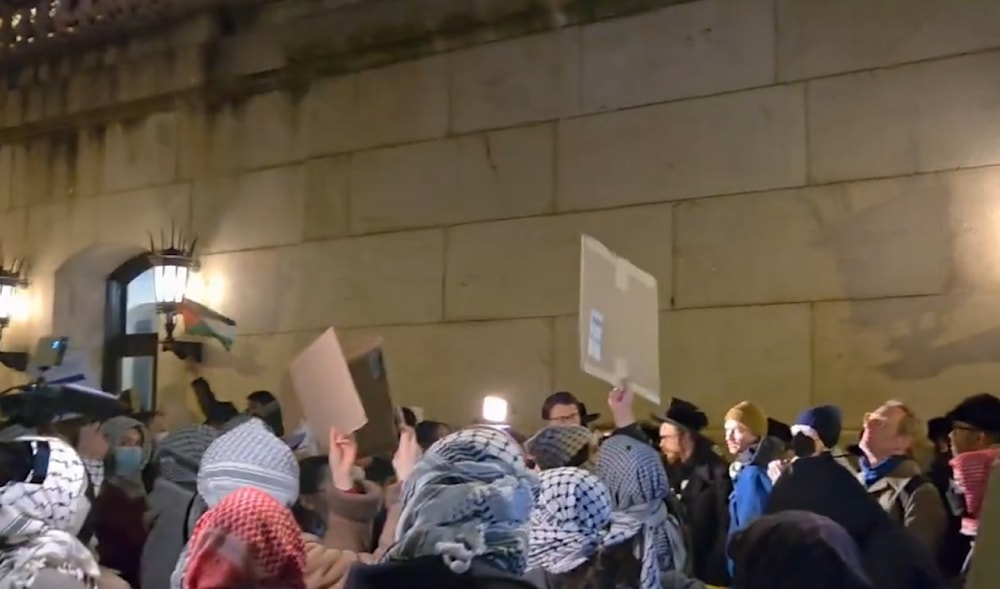200+ protest ex-Israeli PM's visit to Columbia University
Pro-Palestine demonstrators have gathered at Columbia University to protest the university's decision to host former Israeli Prime Minister Naftali Bennett.
-

Pro-Palestine protesters are seen here wearing Koufiyyes and holding the Palestinian flag in a demonstration at Columbia University, New York, on March 5, 2025. (Screengrab)
Over 200 pro-Palestinian demonstrators gathered outside Columbia University in New York on Tuesday to protest the visit of former Israeli Prime Minister Naftali Bennett, who was on campus for a speaking event.
Following more than a year of demonstrations at the university, the appearance of the far-right former leader of "Israel" drew predictable resistance.
A spokesperson for the Columbia Palestine Solidarity Coalition, one of the groups involved in the protest, criticized the university’s decision to invite Bennett, arguing that it signaled preferential treatment of certain perspectives.
"The decision to host a man with such a violent and openly discriminatory record sends a message that the university values some voices over others," the spokesperson said in a statement.
Meanwhile, an anti-Palestine group attempted to counter the protest, prompting police intervention to maintain separation between both demonstrators.
🚨 Protest happening RIGHT NOW as Columbia University is hosting former israeli prime minister Naftali Bennett. War criminals are not welcome in NYC‼️
— Within Our Lifetime (@WOLPalestine) March 5, 2025
📍Columbia University pic.twitter.com/2cDOhDJj5H
Trump cries anti-Semitism
The demonstration coincided with threats from the Trump administration to cut federal funding for Columbia University over allegations of anti-Semitism. On Monday, the federal government announced it was considering revoking over $50 million in contracts, claiming the university failed to safeguard its Jewish students amid the protests.
Trump reiterated this stance on his Truth Social platform, warning that federal funding would be revoked from educational institutions allowing what he termed "illegal protests." He also stated that agitators could face imprisonment, deportation, or permanent expulsion, depending on their actions.
Universities across the United States had risen in solidarity with Gaza and Palestine as the Israeli war on the Strip raged on.
After Columbia students established their Gaza Solidarity Encampment on April 17, University President Nemat Minouche Shafik summoned the NYPD to the campus to disperse the demonstrations, resulting in the arrest of over 100 students. But shortly after, outraged by the footage of their fellow students being arrested, a new group of students arrived on campus and set up another encampment in protest.
The Columbia encampment was forcibly dissolved after police units conducted a massive arrest campaign against students partaking in protests at the university. A hearing took place at the Manhattan criminal courthouse, occurring seven weeks after Columbia University administrators called in a large contingent of armed and heavily armored police officers to dismantle the protest on campus.
Originally held under misdemeanor charges, the dozens of students arrested saw their criminal charges dropped, but faced disciplinary measures such as suspension and expulsion from the university.
Read more: How Columbia University is the new face of the Intellectual Intifada

 3 Min Read
3 Min Read









